- Home
- David Leavitt
The Indian Clerk Page 11
The Indian Clerk Read online
Page 11
“But Cambridge is full of Indians. There's that cricketer.”
“Obviously he's from a different caste. Or at least he's not as orthodox as our friend Ramanujan. Probably he's rich, from Calcutta, or some other cosmopolitan city. But in the south—at least according to this Mallet—they've hung on to all sorts of outmoded traditions. Rules about everything. When to eat, what to eat. Strict vegetarianism. Remember the mutiny of 1857, when those Indian soldiers massacred the British officers because they didn't want to bite into cartridges greased with lard?”
Hardy looks at the meat on his plate with rancor, as if it's somehow to blame. “Madness, all this religion.”
“Not to him, it seems.”
They chew in silence, like ruminants.
“So that's that?” Hardy asks after a moment. “It's over?”
“Probably. Not necessarily.”
“How do you mean?”
“You see, after we had this conversation, I thought it might not be a bad idea to invite this Mallet out for a pint. We got to talking, and he told me a bit more about the case. I asked him how he found all this out, and he said that there was an interview, in Madras, with a fellow called Davies.”
“An interview with Ramanujan?”
Littlewood nods. “Ramanujan was summoned to speak to Davies, and he brought along his boss from the Port Trust Office, an old man who's apparently even more orthodox than he is. Anyway, it happens that Mallet knows this Davies rather well. The way he put it, Davies is ‘one of those come-straight-to-the-point fellows.’ Mallet's hunch is that Davies just blurted out the question—do you want to come to England?—and put Ramanujan on the spot. Ramanujan may well have meant it when he said no. But he also might have said no automatically. Or because the old man was with him, and he didn't want to cause offense by seeming even to consider the possibility.”
“So does that mean he might be persuaded to change his mind?”
“Perhaps. Unfortunately, your good offices are working against us. Since you wrote—because you wrote—his situation has improved markedly. It seems that some of the British officials over there style themselves amateur mathematicians, and so when they heard you'd given him your imprimatur, as it were, they took your letter over to the university and made noises to the effect that if the university wasn't careful, India was going to lose a national treasure. And the university capitulated, at the mere mention of your name. Had you any idea that you wielded such power?”
“No idea whatsoever. And what's the result?”
“They've given him a research grant and he's quit his job at the Port Trust.”
“How much?”
“Mallet didn't know. It's probably a pittance by our standards. Still, enough to keep him going. He's got a family to support. Parents, brothers, a grandmother. And, of course, the wife.”
“He's married?”
Littlewood nods. “She's fourteen.”
“Good heavens.”
“It's normal over there.”
Hardy pushes away his plate even as Littlewood continues to chew. He does not want the venison now.
“So what's next?”
“What's next,” Littlewood said, “is that someone's got to go out to India to convince him. Any volunteers?”
Hardy is silent.
“In that case,” Littlewood says, his mouth full of meat, “our friend Neville may be in for a much harder time than he bargained for.”
4
AFTER DINNER, Hardy writes to Neville, who invites him and Littlewood to tea the following Saturday. Neville is four months married, and has just moved with his new bride into a house on Chesterton Road, near the river. His drawing room has the somewhat overscrubbed look of a space newly furnished, in this case in the aesthetic style, with William Morris wallpaper in dark purples and blues and an ebonized sideboard à la Japonaise. In the middle of the room sits a slat-backed oak settee with attached side tables. Voysey, probably. Hardy and Littlewood regard it warily, then opt for a pair of matching tapestry-covered armchairs that seem to shrink away from the settee like Victorian spinsters from a neo-Expressionist painting. No doubt, like the old piano pushed against the far wall, they are an inheritance.
Books sit piled on the table between them: H. G. Wells's latest novel, Alice's Adventures in Wonderland, something in German on elliptic functions. Through the open windows a smell of roses wafts, as well as the fumes of the occasional car making its progress down Chesterton Road.
A doughy housemaid appears. “Sir and Madam will be down shortly,” she says, before tottering into the kitchen to fetch tea. As if, Hardy thinks, he and Littlewood are an old married couple come to call on the newlyweds. And why not? Circumstances being what they are, it makes sense to invite them together. Recently a porter came to him, scratching his head because he had received a letter addressed to “Professor Hardy-Littlewood, Trinity College, Cambridge.”
Not, as it happens, from India. Not this time.
As they wait, they do not speak. Littlewood has his legs crossed, is turning his foot, snug in its polished shoe, clockwise in circles.
“Herbert, get inside!” a voice cries, and Hardy hears a ball drop, a child's footsteps as it runs inside.
And then, all at once, noises erupt within the house. The housemaid emerges from the kitchen, bearing the tea ensemble on a tray, and Neville and his bride descend the creaky staircase. Hardy and Little-wood stand. Hands are shaken. Then they all sit down, the Nevilles across from their guests, on the oak settee. Alice Neville's hair is reddish, frizzed, done up in a bundle and slightly damp. Loose strands flare out here and there, as if in rebellion against the restraining pins. She wears a velvet dress that does little to conceal the amplitude of her bosom, and gives off the same scent of Parma violets that Hardy's mother does.
Neville sits closer to his wife than would a man who'd been married longer. He is twenty-five, stoop-shouldered, with an oval face and a high forehead over which his hair, piled on the right side of a zigzag part, keeps falling. So nearsighted that even through his spectacles, he has to squint. As the maid hands out the cups, he flashes at Hardy a closed-lip smile that is at once detached and good-natured, sly yet utterly lacking in irony. There is this to say about him: unlike Little-wood or Bohr or, for that matter, any other great mathematician whom Hardy has known, he is happy. Almost carefree. Perhaps this is why he will never amount to anything. He does not embrace solitude, much less suffering. He loves the world too much.
“Well, I've read the letters,” he says, “and I can see what's got you so excited.”
“Really!” Littlewood says. “I'm so glad.”
“There have been a few more developments since we last spoke,” Hardy says.
“Oh? Thank you, Ethel.” Neville accepts a cup.
Littlewood repeats what he learned at the India Office about the Brahmin prohibition against crossing the ocean. “Oh, yes,” Mrs. Neville says. “I remember reading about that once. My grandfather was in India. Thank you, Ethel.”
“Alice is coming with me to Madras,” Neville announces proudly.
“I'm very excited about it. I have an aunt who was an adventuress, she went on safari in Africa and crossed China entirely on her own, with just a friend. A female friend.”
“Your presence in Madras, Mrs. Neville, may prove to be invaluable,” Littlewood says, bowing his head over his teacup.
She flushes. “Me? How? I'm not a mathematician.”
“But there'll be the two of you, won't there, to act as emissaries? And if you'll pardon my saying so, a pretty face might make all the difference.”
“Come, now, Littlewood, I'm not all that ugly,” Neville protests.
“We'll leave the matter of your allure for the ladies to settle.”
“Anyway,” Hardy says, “we're not entirely sure how serious he was being when he said he couldn't come. He might be afraid of causing offense, as it were, to the elders of the tribe.”
“One thing that's becoming increasing
ly clear is that Ramanujan is, to say the least, rather …”
“… sensitive.”
“Well, what can we do?”
“Meet with him. See if he's the real thing, and if he is, see if you can talk him into coming.”
“But how could we? If his religion won't allow it—”
“We have reason to believe he might be more flexible on the religious question than the local authorities assume,” Hardy says.
“Is he married?” Mrs. Neville asks.
“Oh, yes. His wife is fourteen.”
“Fourteen!” Neville says. “But I suppose that's common in India.”
“Usually the wedding takes place when the bride and groom are about nine,” Mrs. Neville says. “But then the bride stays with her own family until puberty.”
“What an idea!” Neville puts his arm around Alice's shoulders. “The only trouble, Alice, is that when I was nine and you were nine, I probably would have run screaming from you. From any girl.”
“You would have loathed me when I was nine. I was a bundle of sticks with pigtails.”
“As Littlewood was saying,” Hardy says, “since I wrote to Ramanujan, his situation's improved. Even so, there's nothing there for him. He needs to be somewhere where there are men he can work with. Men on his level. Or perhaps I should say, men who approach his level.”
Neville raises his eyebrows. “High praise,” he says. “Well, we'll certainly do everything we can.”
“Yes,” Mrs. Neville says. “I'm quite looking forward to meeting Mr. Ramanujan. And perhaps even Mrs. Ramanujan.”
“The mother?”
“Her too.”
Neville laughs, and kisses his wife on the cheek.
“Well, do you think he can do it?” Hardy asks Littlewood, as they make their way down Magdalene Street.
“If he can't, she can.”
“You keep saying that. I'm afraid I don't quite see it.”
“No, you probably wouldn't.”
Hardy looks at him.
“I don't really mean that,” Littlewood says. “The point is, she's got a sense of herself. Stronger than Neville's. Mark my words, she's capable of persuasion.”
“Neville is so very … nice.”
“He is, rather. But that might not be a bad thing. As we've learned of late, for all his bluster, our Indian friend is easily offended. At this stage a gentler touch may be required than you or I can manage.”
“You phrased that very delicately.”
“I'm not saying we're brutes, or that Neville's some weakling … only that… Well, for one thing, they're more or less the same age. In the same season of life, as a friend of mine might put it.”
Hardy smiles faintly. He knows he's not supposed to say he knows who “the friend” is.
They are nearing Trinity. It is the season of balls, and undergraduates in formal dress stroll about the street, some of them accompanied by young women in gowns with tight waists and trailing hems. The sun has just set, the evening is warm, dinner in Hall awaits them. But no one whom either might sit too close to, as Neville did to Alice. At least not tonight.
At the gate, they say goodbye, each returning to his own rooms. As he settles himself into his chair with Hermione, Hardy feels a shudder of alarm shoot through him.
It is Gaye. Nothing so gothic as the bust speaking. He simply appears from the shadows near the window, his hands clasped behind his back. He does this sometimes.
“Harold,” he says.
“Russell,” Hardy says.
Leaning over, Gaye kisses Hardy on the top of his head. He's wearing a smoking jacket and his Westminster tie. His hair looks lacquered. “So I gather the Indian fellow's not coming,” he says. “Doesn't look like it.”
“And what does that make you feel? Regret? Relief?” “Regret, of course. It's essential that he come to Cambridge.” “Oh, come on, Harold. A boy from some tiny place you've never heard of, married to a child and beholden to a religion the doctrines of which you find utterly perverse. And on top of that, you've never seen him. He could be ugly as homemade sin.”
“He's a genius, Russell. And he's dying out there.” Gaye claps his hands together. “Ah, of course! That old compulsion to rescue people. It comes out trumps every time. How good it must make you feel about yourself. And yet it must be something of a burden, too.” He winks. “A pity you couldn't rescue me.” Hardy stands, shaking Hermione off his lap. “Russell—” But Gaye is gone. Hermione, discomposed, slinks toward the shadows from which her master emerged, and into which he has disappeared. In death, it seems, he is determined to have what he so rarely had in life: the last word.
5
New Lecture Hall, Harvard University
IN THE LECTURE he did not give, Hardy said:
As a child I believed in more than I do now. For one thing I believed in ghosts. This was mostly thanks to my mother, who told me when I was very young that a ghost haunted our house in Cranleigh, the ghost of a girl who had died in my bedroom of typhoid, many years before, on the eve of what would have been her wedding day. Neither Gertrude nor I ever encountered this ghost, whose behavior, according to my mother, was generally benign. Occasionally—but only when my mother was alone in the house—the ghost would play a tinkling melody on the piano that my mother did not recognize and that sounded out of tune even when the piano had just been tuned. Or the ghost stamped her foot, like a child having a tantrum. Her encounters with the ghost my mother reported dutifully to us (but never to my father); as we listened, we would affect the benevolent and condescending patience of the governess putting the restless, tale-telling child to bed. For even then, my sister and I were confirmed rationalists; and we took it for granted that our mother was a rationalist, too, that she told these stories only to amuse and bewitch us, although once I came home from school to find her white as a sheet, gazing in astonishment at the piano.
The odd part is, I think I believed in her ghost more than she did— this though I never had a single personal encounter with the creature who had died in my bedroom. Today, if I were compelled to choose between Christianity and that occult program that attributes to the dead the capacity to trouble and console the living, or to pass cryptic messages through the curtain that divides their realm from ours, or to possess the bodies of animals, or trees, or bureaus, I should still plump for ghosts. The idea that a spirit might linger on this earth makes an intuitive sense to me that the vision imposed upon us by Christianity, of a vague, dull heaven and a horrible, fascinating hell, never will.
Not that I've had much personal experience of ghosts. The only “visitations” I ever received took place over the course of the decade or so following the death of my friend Gaye. Whenever Gaye “appeared,” in those years, I would at first question my own sanity, and wonder if I should fly to the nearest asylum, or to Vienna. Then I would question my own rationalism, and wonder if I should wire O. B., who was affiliated with the Society for Psychical Research. Then I would question my own questioning: what was this apparition, after all, if not the belated expression of an old impulse, the one that drives the solitary child to invent an imaginary friend? For I missed Gaye terribly in those years; I missed his voice, and his arch tongue, and his refusal to suffer fools gladly. I wasn't an idiot. I didn't conjure him in the hope that he would console or reassure me. On the contrary, I wanted him to tell me the truth, even when it was brutal. His arrivals not only made me less lonely, they contradicted a doctrine that would have placed him, for a host of reasons, in some deep and terrible realm of a Boschian hell, rather than allow him to float about Cambridge in his smoking jacket and Westminster tie, observing our capers with bemused detachment. In the same way I suspect that my mother's ghost, struck down on the eve of her wedding, represented to her an ideal of marriage all the more alluring for its having been preserved forever in the amber of imminence.
Like me, Gaye was an atheist. As he told it, his war with God dated to very early in his childhood. According to our religious edu
cation, God was supposed to be an entity neither animal nor man nor any combination of the two. Nor was God a plant. This entity was supposed to exist, as you or I or the sun or the moon exist, but not as King Lear or Little Dorrit or Anna Karenina exist. And it was supposed to have a mind, not unlike our own minds, but grander, because it had created him and me and everything else in the universe.
Gaye accepted none of this. Neither did I. I've never seen how any sane or rational person could. No doubt in a hundred years only the most primitive of peoples will still worship the Christian God, and then our unbelief will be vindicated.
Oddly enough, given its supposed liberalism, atheism was much frowned upon at Cambridge. Even in the Society there were few who admitted to being atheists. Instead the brethren were forever trying to wrap their religious skepticism in vague, “emotional” statements about “God” and “Paradise.” That shit McTaggart, for instance, with his snug little Trinity College of a Heaven, and all the archangel undergraduates buggering one another while seraphim and cherubim fetch cups of tea; or Russell, who envisioned a universe also like Trinity—aloof, rife with inefficiency, arrogant. His idea was that what mattered in religion was not the specificity of the dogma but the feelings that underlay belief: feelings, in his words, “so deep and so instinctive as to remain unknown to those whose lives are built upon them.”
As you have no doubt already surmised, I hold no truck with any of these efforts to placate the clerics. Christian devotion of any sort, in my opinion, is anathema to thought. I don't believe Ramanujan was especially devout either, despite all the nonsense he talked about the goddess Namagiri and what have you. He just said what he'd been raised to say, and if he believed in any of it, he believed in it as I believed in Gaye's ghost.

 Shelter in Place
Shelter in Place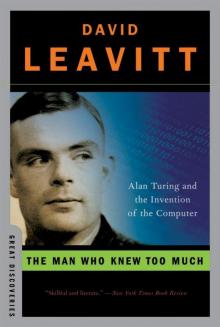 The Man Who Knew Too Much: Alan Turing and the Invention of the Computer (Great Discoveries)
The Man Who Knew Too Much: Alan Turing and the Invention of the Computer (Great Discoveries)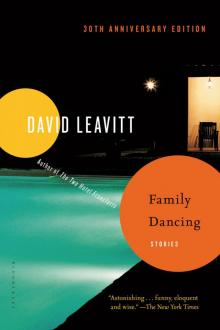 Family Dancing
Family Dancing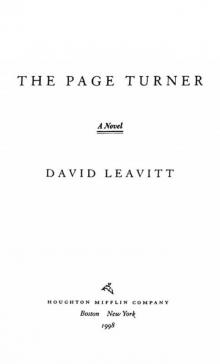 Page Turner Pa
Page Turner Pa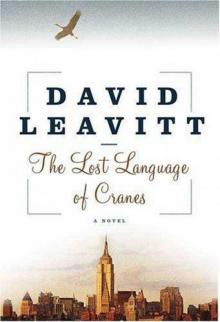 The Lost Language of Cranes: A Novel
The Lost Language of Cranes: A Novel The Body of Jonah Boyd
The Body of Jonah Boyd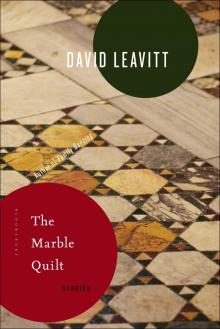 The Marble Quilt
The Marble Quilt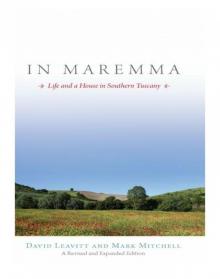 In Maremma
In Maremma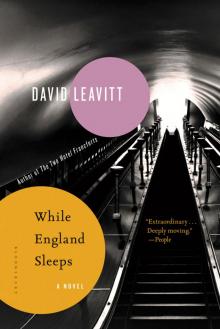 While England Sleeps
While England Sleeps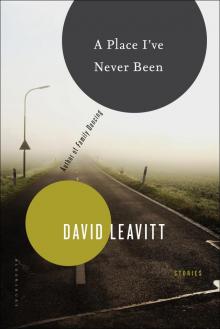 A Place I've Never Been
A Place I've Never Been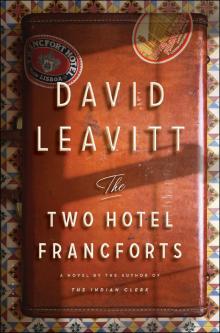 The Two Hotel Francforts
The Two Hotel Francforts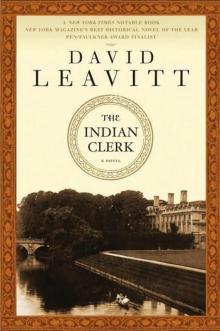 The Indian Clerk
The Indian Clerk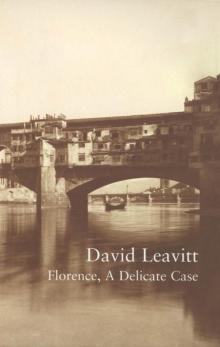 Florence
Florence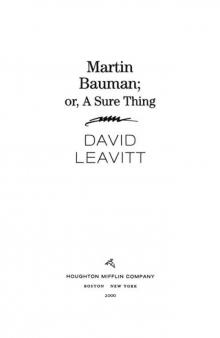 Martin Bauman
Martin Bauman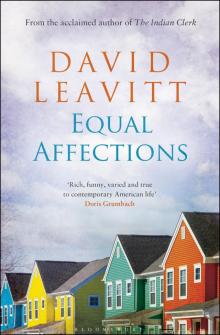 Equal Affections
Equal Affections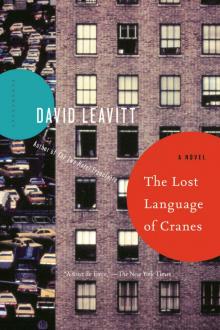 The Lost Language of Cranes
The Lost Language of Cranes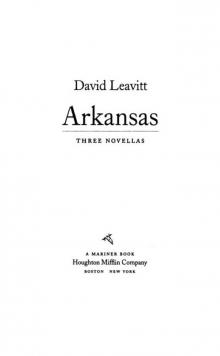 Arkansas
Arkansas